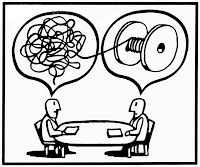Why is it so hard to sort out our own problems alone?
I am a big believer in externalising our thinking as a way of helping us untangle the strands of our lives. Humankind has always found ways of doing this … the confessional, diarying and journaling, or talking it over with a trusted friend are all ways of getting a problem out of our heads and into some sort of good order
I think good coaching, however, takes it a step further. Coaching not only allows us to get the problem out there, but helps us to understand how we are thinking about the issue in hand – and see how our own thinking often gets in our way. Somehow having our own thoughts reflected back to us, not only helps to put issues into perspective, but improves how we think as well.
So.. what is the problem you are wrestling with in you head? Go tell someone and see how different if feels.





